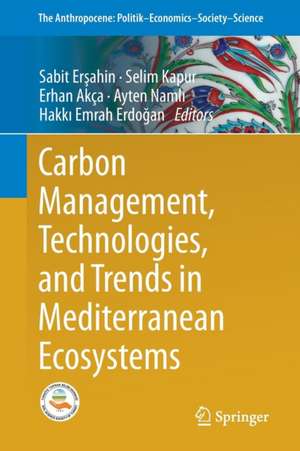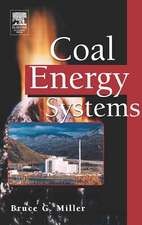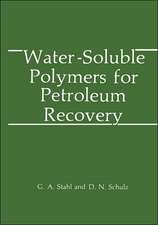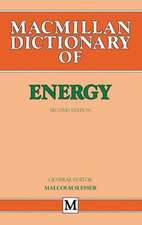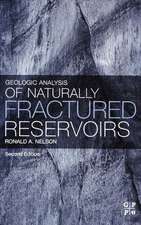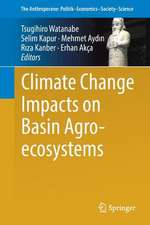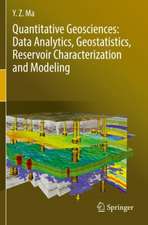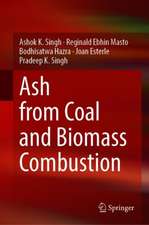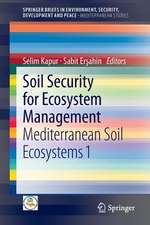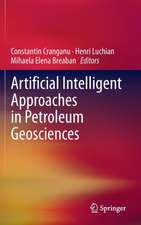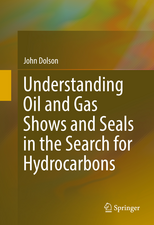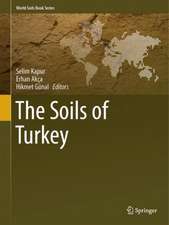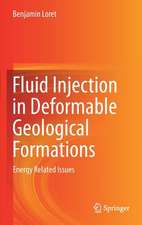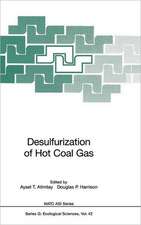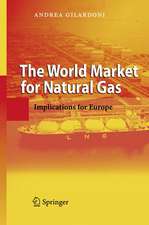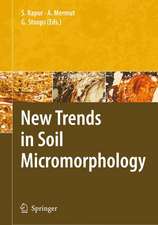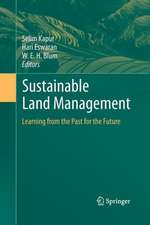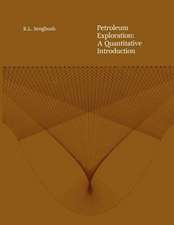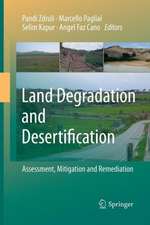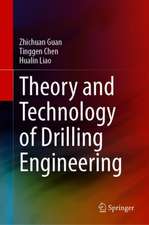Carbon Management, Technologies, and Trends in Mediterranean Ecosystems: The Anthropocene: Politik—Economics—Society—Science, cartea 15
Editat de Sabit Erşahin, Selim Kapur, Erhan Akça, Ayten Namlı, Hakkı Emrah Erdoğanen Limba Engleză Paperback – 16 dec 2016
The book addresses the summit’s three main themes – carbon management, carbon technologies, and carbon trends – while also offering chapters on the economic aspects of carbon management and the ecological aspects of the carbon cycle. The chapters on economic aspects analyze the carbon trade and its institutional, political, and legislative structures in different Mediterranean nations, while those on ecological aspects review the discourse on and analysis of the related ecological factors and their feedback due to governance processes.
Din seria The Anthropocene: Politik—Economics—Society—Science
-
 Preț: 403.48 lei
Preț: 403.48 lei -
 Preț: 361.89 lei
Preț: 361.89 lei -
 Preț: 380.63 lei
Preț: 380.63 lei - 20%
 Preț: 583.00 lei
Preț: 583.00 lei -
 Preț: 389.49 lei
Preț: 389.49 lei -
 Preț: 390.46 lei
Preț: 390.46 lei - 5%
 Preț: 361.80 lei
Preț: 361.80 lei -
 Preț: 379.09 lei
Preț: 379.09 lei -
 Preț: 384.48 lei
Preț: 384.48 lei -
 Preț: 451.26 lei
Preț: 451.26 lei -
 Preț: 391.40 lei
Preț: 391.40 lei -
 Preț: 430.21 lei
Preț: 430.21 lei -
 Preț: 387.75 lei
Preț: 387.75 lei -
 Preț: 378.34 lei
Preț: 378.34 lei -
 Preț: 418.29 lei
Preț: 418.29 lei - 5%
 Preț: 399.91 lei
Preț: 399.91 lei -
 Preț: 428.07 lei
Preț: 428.07 lei -
 Preț: 386.39 lei
Preț: 386.39 lei -
 Preț: 392.75 lei
Preț: 392.75 lei -
 Preț: 424.22 lei
Preț: 424.22 lei -
 Preț: 384.09 lei
Preț: 384.09 lei -
 Preț: 429.61 lei
Preț: 429.61 lei -
 Preț: 381.98 lei
Preț: 381.98 lei -
 Preț: 415.83 lei
Preț: 415.83 lei -
 Preț: 382.18 lei
Preț: 382.18 lei - 15%
 Preț: 647.40 lei
Preț: 647.40 lei - 18%
 Preț: 1123.04 lei
Preț: 1123.04 lei - 15%
 Preț: 579.34 lei
Preț: 579.34 lei - 18%
 Preț: 802.46 lei
Preț: 802.46 lei - 18%
 Preț: 944.51 lei
Preț: 944.51 lei -
 Preț: 383.33 lei
Preț: 383.33 lei -
 Preț: 383.33 lei
Preț: 383.33 lei -
 Preț: 383.33 lei
Preț: 383.33 lei -
 Preț: 380.07 lei
Preț: 380.07 lei -
 Preț: 413.66 lei
Preț: 413.66 lei -
 Preț: 417.52 lei
Preț: 417.52 lei
Preț: 380.84 lei
Nou
Puncte Express: 571
Preț estimativ în valută:
72.87€ • 76.09$ • 60.18£
72.87€ • 76.09$ • 60.18£
Carte tipărită la comandă
Livrare economică 15-29 aprilie
Preluare comenzi: 021 569.72.76
Specificații
ISBN-13: 9783319450346
ISBN-10: 3319450344
Pagini: 136
Ilustrații: X, 158 p. 58 illus., 41 illus. in color.
Dimensiuni: 155 x 235 x 9 mm
Greutate: 0.25 kg
Ediția:1st ed. 2017
Editura: Springer International Publishing
Colecția Springer
Seria The Anthropocene: Politik—Economics—Society—Science
Locul publicării:Cham, Switzerland
ISBN-10: 3319450344
Pagini: 136
Ilustrații: X, 158 p. 58 illus., 41 illus. in color.
Dimensiuni: 155 x 235 x 9 mm
Greutate: 0.25 kg
Ediția:1st ed. 2017
Editura: Springer International Publishing
Colecția Springer
Seria The Anthropocene: Politik—Economics—Society—Science
Locul publicării:Cham, Switzerland
Cuprins
Introduction.- Soil Carbon Impacts on Functionality and Environmental Sustainability.- New World Atlas of Desertification and Issues of Carbon Sequestration, Organic Carbon Stocks, Nutrient Depletion and Implications for Food Security.- Terrestrial Ecosystem Carbon Dynamics as Influenced by Land Use and Climate.- EU Emissions Trading Scheme Application in Bulgaria, Greece and Romania from 2008 to 2012.- Indigenous Egyptian Nubians and Climate Change Mitigation.
Textul de pe ultima copertă
This book is unique covering both ecologic and socio-economic aspects of carbon manage¬ment in Mediterranean ecosystems. The chapters were originally presented at the 1st Istanbul Carbon Summit that was held at Istanbul Technical University, 2-4 April 2014 and subsequently revised after a peer review process. The summit focused on carbon manage¬ment, carbon technologies, and carbon trends. This book includes chapters on economic aspects of carbon management and on ecological aspects of the carbon cycle. The chapters on economic aspects analyze carbon trade and its institutional, political, and legislative structures in different Mediterranean nations, while those on ecological aspects review the discus¬sion and analysis of the related ecological factors and their feedbacks due to governance processes.
Contents
Introduction - 1: Soil Carbon Impacts on Functionality and Environmental Sustainability (Lal)—2: New World Atlas of Desertification and Issues of Carbon Sequestration, Organic Carbon Stocks, Nutrient Depletion and Implications for Food Security (Zdruli, Lal, Cherlet, Kapur)—3: Terrestrial Ecosystem Carbon Dynamics as Influenced by Land use and Climate (Erşahin, Kapur, Aydın, Akça, Tolunay, Görücü, Karahan, Bilgili)— 4: EU Emissions Trading Scheme Application in Bulgaria, Greece and Romania from 2008 to 2012 (Hatzilau, Giannakopoulos, Karellas, Kakaras—5: Indigenous Egyptian Nubians and Climate Change Mitigation (Ahmed)—6: Carbon Trading Via Exports: Comparison of the Emissions Embodied In Exports In China And Turkey (Erk, Cengiz)—7: Energy–Economy–Ecology–Engineering (4E) Integrated Approach for GHG Inventories (Sulukan, Sağlam, Sıdkı Uyar)—8: Cost-Benefit Assessment of Implementing LULUCF Accounting Rules in Turkey (Bouyer, Serengil)—9: Carbon Certification of Afforestation/Reforestation Areas in Turkey (Ülgen, Kuş, Güneş, Kiriş,.Özel, Zeydanli)—10: Carbon Sequestration and Mycorrhizae in Turkish Soils (Ortaş , Lal, Kapur)
Editors:
Sabit Erşahin, Professor of Soil Science, Faculty of Forestry of the Çankırı Karatekin University, Turkey.
Selim Kapur, Professor of Soil Science, Faculty of Agriculture of the University of Çukurova, Adana, Turkey.
Erhan Akça, Assoc. Professor, School of Technical Sciences of the Adıyaman University, Adıyaman, Turkey.
Ayten Namlı, Professor of Soil Science, Faculty of Agriculture of the University of Ankara, Ankara, Turkey.
Hakkı Emrah Erdoğan (Ph.D), Ministry of Food, Agriculture and Livestock, Ankara, Turkey.
Caracteristici
Discusses carbon trade in Mediterranean countries Examines social ecology of carbon management in ecosystems taking different socio-economic and socio-ecologic structures in the Mediterranean region into account Offers original research results on carbon sequestration Includes supplementary material: sn.pub/extras
